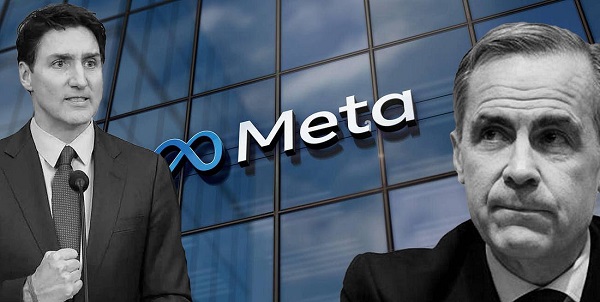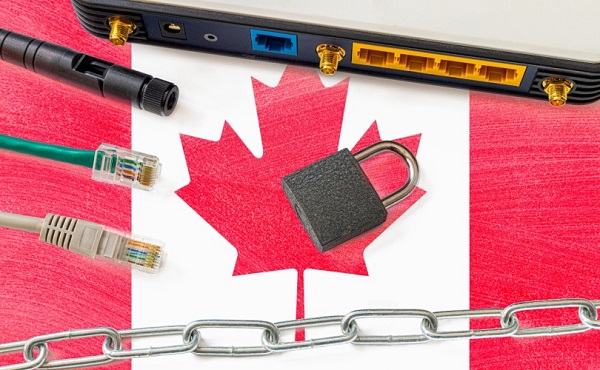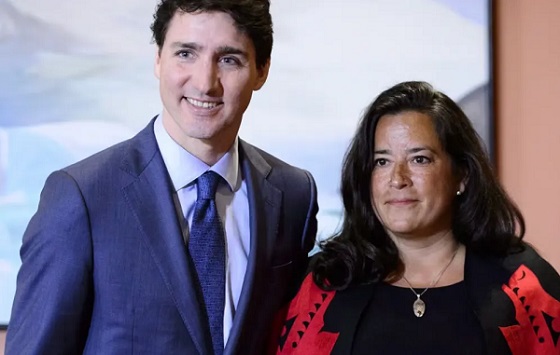Internet
Meta’s “Threat to Democracy” gets federal ad dollars

Trudeau’s Meta Meltdown: From “Threat to Democracy” to Paid Partner in Record Time
Justin Trudeau and his Liberals just bent the knee to Mark Zuckerberg. After months of grandstanding, after endless moralizing about the dangers of Big Tech, after accusing Meta of threatening Canadian democracy—yesterday, Trudeau caved. The same Liberal government that once pulled all federal advertising from Facebook and Instagram in protest of Meta’s decision to block Canadian news quietly resumed buying ads on the platform. And just like that, the so-called existential crisis was forgotten.
The reason? In wake of the next federal election and a housing crisis the Trudeau government needs to sell its latest housing plan. They’ve set aside up to $100,000 in taxpayer money to advertise their GST break on rental housing investments—using the very platform they declared an enemy of democracy. So, the threat wasn’t serious enough to actually stick to their boycott, but it was serious enough to justify months of outrage. That’s the hypocrisy of the Liberal Party. Trudeau threw a tantrum when Meta refused to bankroll his failing legacy media allies, but the moment he needed to push his own messaging, he came crawling back.
How We Got Here: Trudeau’s Failed Attempt to Shake Down Big Tech
This entire mess started with Bill C-18, the Online News Act, a piece of legislation that was doomed from the start. The bill was designed to force tech companies like Meta and Google to pay Canadian media outlets for news links shared on their platforms. Trudeau and his allies tried to frame this as a move to “save Canadian journalism,” when in reality, it was just another corporate welfare scheme for failing legacy media outlets that can’t survive without government handouts.
But here’s the problem: Meta doesn’t need Canadian news. Trudeau bet that tech giants wouldn’t dare cut off an entire country’s news industry. He thought they’d cave, fork over millions, and fund his media cronies. Instead, Meta called his bluff and blocked Canadian news entirely.
Overnight, all Canadian news links disappeared from Facebook and Instagram. It was a foreseeable consequence, something anyone with basic common sense could have predicted. But the Trudeau government, in its usual arrogance, pushed forward anyway.
In retaliation, Trudeau and his ministers pulled all federal ad spending from Meta’s platforms. He went in front of the cameras, shaking with righteous fury, calling Meta’s decision an assault on democracy itself. He even tried to claim it was a life-and-death issue—arguing that, during emergencies like the devastating wildfires in British Columbia and the Northwest Territories, Canadians were being put at risk because they couldn’t access news on Facebook.
This was always a lie. And Trudeau’s decision to return to Meta proves it.
The Impact: Trudeau Hurt Canadian Media, Not Big Tech
Let’s be clear about what really happened: Bill C-18 didn’t save journalism—it crippled it.
News outlets relied on social media to drive traffic to their websites. By forcing Meta’s hand, Trudeau effectively cut off a major traffic source for the very media companies he claimed to be helping. According to the Media Ecosystem Observatory, engagement with Canadian news outlets plummeted by 85% on Facebook and Instagram. That’s an estimated 11 million fewer daily views—a devastating blow to an industry already on life support.
The Liberals pretended that Big Tech was the enemy, but the real victims of Bill C-18 weren’t the tech companies—it was the Canadian media outlets who suddenly lost their audience. Small, independent newsrooms—already struggling to compete with taxpayer-funded giants like the CBC—saw their reach collapse overnight. And while Trudeau patted himself on the back for “standing up” to Meta, actual journalists lost their jobs.
So what did the Liberals do? They doubled down. They called Meta’s move “censorship,” as if blocking news links—a direct response to the government’s own law—was somehow an attack on free speech. They accused Zuckerberg of blackmail, of manipulating Canadian politics, of undermining democracy itself. But now, just months later, they’re happily handing taxpayer money back to Meta. If this was really about democracy, if this was really about public safety, then why is Trudeau suddenly fine with using the very platform he condemned?
The biggest takeaway here is how fake the Liberals’ outrage always was. Trudeau screamed about Meta blocking news during wildfire season, claiming Canadians were being denied vital safety information. But now, the government has admitted that if it really wants to reach Canadians, all it has to do is buy some ads.
So why didn’t they just do that in the first place? If getting wildfire updates to people was really the issue, the government could have bought ad space months ago to ensure critical information reached Canadians. But they didn’t—because this was never about public safety. It was never about “access to news.” It was never about “protecting democracy.”
It was about Trudeau trying to force Big Tech to fund his media allies.
This government has spent years bailing out failing legacy media outlets with taxpayer money. From direct subsidies to CBC’s bloated budget, the Liberals have been funneling cash into the media industry in exchange for favorable coverage. Bill C-18 was just another attempt to shake down tech companies to keep the gravy train rolling. But instead of forcing Big Tech to pay up, Trudeau screwed over the very industry he was claiming to protect.
Why Bill C-18 Was Destined to Fail
This was always going to be a disaster. The entire premise of the law was backwards. Instead of recognizing that platforms like Facebook were driving traffic to news outlets for free, Trudeau decided to tax them for it. The predictable response? They just stopped offering the service entirely.
This is the equivalent of a grocery store charging brands a mandatory fee every time a customer picks up a product. The logical response? The brands pull their products from the shelves. That’s exactly what happened here. Meta doesn’t need news content to survive—but Canadian news organizations do need Meta.
Instead of acknowledging reality, Trudeau doubled down on his losing hand, cutting off ad spending, demonizing tech companies, and insisting he was fighting for democracy. And now, after months of that performative outrage, he’s quietly slipping money back into Meta’s pockets, hoping no one notices.
Bill C-18: The Final Humiliation
Let’s summarize, just so we’re all clear on the level of incompetence we’re dealing with here.
Justin Trudeau picked a fight with Meta. Meta laughed in his face, called his bluff, and walked away. Canadian media—already on life support—got crushed in the crossfire. The Liberals, in their usual fashion, threw a hissy fit, cut all government ad spending from Meta, and declared they were taking a stand for democracy. Trudeau even had the audacity to claim that blocking news on Facebook was putting lives at risk—as if Canadians were sitting in wildfire-ravaged forests desperately refreshing their Facebook feeds for government updates.
And now? The Liberals just quietly reversed course, handing Mark Zuckerberg a fat stack of taxpayer cash. Why? Well, because they need to get their message out ahead of a leadership race and looming Trump tariffs. That’s right—they prorogued Parliament because their own party is in shambles, but hey, they’ve still got time to run ads on the “threat to democracy” platform.
And the best part? The real kicker? They could have done this for free the entire time. The government could have just posted its messaging online, at no cost, instead of spending months whining about how Meta was silencing Canadians. But no—because that would have required foresight, competence, and a functioning brain, none of which exist in this Liberal government.
So let’s just spell it out: This wasn’t about saving journalism. It wasn’t about protecting democracy. It wasn’t even about keeping Canadians informed during emergencies. This was about Trudeau trying to strong-arm Big Tech into funding his media lapdogs, failing miserably, and now pathetically crawling back, hoping no one notices.
And now, after all that grandstanding, all that moralizing, all that taxpayer money wasted on a failed stunt, Trudeau is quietly slipping dollars back into Zuckerberg’s pockets—all while pretending like none of this ever happened.
Embarrassing.
Subscribe to The Opposition with Dan Knight .
For the full experience, upgrade your subscription.
Censorship Industrial Complex
Pro-freedom group to expose dangers of Liberal ‘hate crime’ bill before parliamentary committee

From LifeSiteNews
Canada’s Liberal justice minister has confirmed that the legislation would allow a person to be criminally charged for social media posts deemed offensive by the government.
A top Canadian pro-freedom group has been asked to testify regarding the dangers of the Liberals’ proposed internet censorship legislation.
In an October 28 press release, the Democracy Fund (TDF) announced that the Standing Committee on Justice and Human Rights has invited them to appear at the House of Commons to debate Bill C-9, which experts have warned could kill free speech in Canada.
“Our lawyers have extensive experience defending Canadians accused of breaching speech codes or uttering speech deemed ‘offensive’ by authorities,” TDF litigation director Mark Joseph stated. “We look forward to sharing our legal expertise and concerns about Bill C-9 with the Committee.”
Bill C-9, the Combating Hate Act, has been blasted by constitutional experts as allowing empowered police and the government to go after those it deems have violated a person’s “feelings” in a “hateful” way.
Bill C-9 was brought forth in the House of Commons on September 19 by Justice Minister Sean Fraser. The Liberals have boasted that the bill will make it a crime for people to block the entrance to, or intimidate people from attending, a church or other place of worship, a school, or a community center. The bill would also make it a crime to promote so-called hate symbols and would, in effect, ban the display of certain symbols such as the Nazi flag.
Canada’s Liberal justice minister has confirmed that the legislation would allow a person to be criminally charged for social media posts deemed offensive by the government.
Currently, the legislation is undergoing debate as Canadian lawmakers discuss how best to frame and implement the bill. Issues with the legislation, as pointed out by TDF, include “broad and undefined language” that could allow for widespread censorship online.
TDF warned that the bill “could be used to justify increased censorship and restrict Canadians’ rights to peacefully assemble, protest, and speak freely, particularly on digital platforms.”
The Committee meeting, scheduled for November 6, is a crucial part of Parliament’s review process before the bill continues to its third reading in the House of Commons.
TDF’s warnings against the legislation echo statements from various pro-freedom legal groups across Canada.
As LifeSiteNews previously reported, Justice Centre for Constitutional Freedoms (JCCF) president John Carpay has warned that Canada will be a “police state by Christmas” if lawmakers pass three new bills introduced by the federal Liberal government of Prime Minister Mark Carney.
Carpay further predicted that Bill C-9 would “empower police” and the government to go after those it deems have violated a person’s “feelings” in a “hateful” way.
The proposed legislation mirrors a movement in Germany to restrict sharing controversial or anti-government content online by arresting citizens who posted content deemed ‘hateful’ by the German government.
As LifeSiteNews previously reported in June, German authorities conducted more than 180 operations across the country, targeting individuals accused of spreading hate and incitement online – most of them tied to content considered far-right.
Internet
Musk launches Grokipedia to break Wikipedia’s information monopoly

Elon Musk’s artificial intelligence venture xAI launched “Grokipedia” on Monday — a new online encyclopedia built to challenge what he says is Wikipedia’s entrenched political bias. The site, powered by xAI’s technology and integrated with Grok, the same AI system behind Musk’s X platform, aims to provide a politically balanced alternative to the long-dominant Wikipedia, which critics have accused for years of leftist censorship and selective editing.
Grokipedia, now live in its beta “v0.1” stage, opens with roughly 885,000 entries — a fraction of Wikipedia’s seven million English-language pages but a notable start for a platform that launched just hours ago. Some users experienced temporary errors upon the rollout, but by Monday evening the site was running smoothly. Musk framed the project as part of his broader effort to restore transparency and ideological diversity to the digital space, echoing his moves to overhaul Twitter into X.
The billionaire’s feud with Wikipedia co-founder Jimmy Wales has grown increasingly bitter in recent months. Musk has accused Wales of allowing Wikipedia to devolve into a propaganda outlet that protects liberal narratives while suppressing dissenting voices. “Defund Wikipedia until balance is restored,” Musk wrote in a January post on X. Wales, for his part, has dismissed Grokipedia as an unserious experiment, telling the Washington Post last week that AI-generated content is prone to “massive factual errors” and lacks editorial oversight.
Breitbart News has documented numerous examples of Wikipedia’s bias, from its editors smearing Turning Point USA founder Charlie Kirk following his assassination to attempts to delete articles about his widow Erika Kirk and Ukrainian activist Iryna Zarutska. One editor even proposed deleting Bible verses, while another added Nazi references to politically conservative entries. The site’s governing “neutrality working group,” announced amid backlash, has ignored allegations of left-wing bias and instead congratulated itself on maintaining “neutrality on contentious subjects.”
Grokipedia vs. Wikipedia on Charlie Kirk.
We all knew Wikipedia sucked, but this hit a nerve.
Grokipedia is the obvious choice. pic.twitter.com/BEWLCNPtp7
— Defiant L’s (@DefiantLs) October 28, 2025
For Musk, Grokipedia represents more than a product launch — it’s another front in his campaign to dismantle what he sees as the internet’s entrenched progressive gatekeepers. While Wikipedia’s defenders dismiss his challenge as quixotic, the early traffic surge to Grokipedia suggests that many users are ready to see if Musk’s alternative can deliver what the old encyclopedia no longer does: balance, transparency, and a willingness to question the narrative.
(Photo/Alex Brandon)
-

 Alberta1 day ago
Alberta1 day agoFrom Underdog to Top Broodmare
-

 International2 days ago
International2 days agoPrince Andrew banished from the British monarchy
-

 Business2 days ago
Business2 days ago“We have a deal”: Trump, Xi strike breakthrough on trade and fentanyl
-

 Alberta2 days ago
Alberta2 days agoProvince orders School Boards to gather data on class sizes and complexity by Nov 24
-

 Crime2 days ago
Crime2 days agoCanada Seizes 4,300 Litres of Chinese Drug Precursors Amid Trump’s Tariff Pressure Over Fentanyl Flows
-

 National2 days ago
National2 days agoWatchdog Presses Ottawa to Release Hidden Lobbying Rulings
-

 Alberta2 days ago
Alberta2 days agoHow one major media torqued its coverage – in the take no prisoners words of a former Alberta premier
-

 National2 days ago
National2 days agoWatchdog Asks Whether RCMP Brass Shielded Lobbyists in Ottawa’s Influence Scandals










